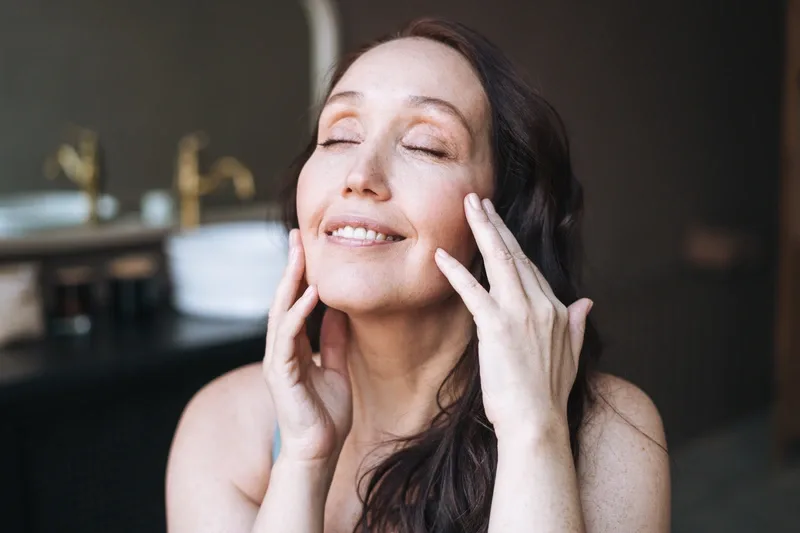Women experience marked changes in their body as they age. For some, navigating these changes can bring up many different emotions. In a study published in the Journal of Women & Aging, survey data showed that women over the age of 50 felt that physical signs of aging, including skin changes, impacted their body image.(1) Social stigma, especially for women, can contribute to negative public perceptions of aging. However, a growing body of research shows that older women actually tend to experience greater emotional well-being compared to younger women, in part because older women tend to be more receptive to aging.(2)
Many women report an increase in skin laxity, dryness, and wrinkles after menopause.(3) In addition to factors like smoking, sun damage, and natural aging, hormone fluctuations also influence skin changes. Hormone replacement therapy (HRT) can help restore hormone levels that decrease during menopause, enhancing the skin’s tone and texture. For women looking to address age-related skin changes, HRT can help them confidently embrace this stage of life.
What happens to the skin as women age during menopause?
The skin is an organ made up of three primary layers, each serving a specific function:(4)
The Epidermis: This is the outermost layer of skin that acts as a protective barrier against germs and environmental elements. Composed of five sublayers, the epidermis sheds old skin cells, forms new skin, and protects against damage from ultraviolet (UV) rays.
The Dermis: The dermis is the skin’s second layer and is responsible for 90% of its thickness.(4) It plays a key role in regulating body temperature and facilitating blood flow to the epidermis. The dermis also contains sweat glands, oil glands, and hair follicles, as well as collagen and elastin — proteins that give skin its elasticity and strength.
The Subcutis: This is the deepest layer of skin that stores fat, insulates the body, and absorbs shock to keep essential organs safe from injury.
The following are common skin changes that develop as women age:(3)(5)
Fine lines and wrinkles
Sagging
Drying
Uneven tone
Reduced elasticity
Decreased thickness
Increased fragility
Worsening dark circles under the eyes
Hyperpigmentation
Decreased vascularity
Adult female acne (AFA)

These changes occur due to a drop in estrogen levels during menopause. Women produce the greatest amounts of estrogen in their 20s but lose approximately half of these levels by the age of 50, with continued decreases during postmenopause.(6)
During this phase of life, the skin loses collagen and experiences a decline in elastin production. This causes skin to sag, thin, and lose moisture. Research shows that skin thickness decreases by 1.13% every year during postmenopause, with collagen levels dropping by 2% annually.(5)
As estrogen levels drop, an imbalance in androgen circulation occurs in the body. Androgens are a group of steroid hormones produced in both men and women that support reproductive health and the development of male sex characteristics. This imbalance can lead to increased oil secretion, which is why some menopausal women may become more prone to acne.(3) HRT can help reduce these skin changes.
How does HRT impact the skin?
HRT impacts the skin in a number of ways. Studies show that transdermal estrogen therapy helps maintain hydration and enhances the health of the skin barrier, both of which can influence skin dryness. Systemic estrogen therapy has also been shown to decrease oil gland production, potentially minimizing breakouts. In contrast, combined HRT with estrogen and progesterone may increase oil secretion, which can help alleviate dry skin.(7)
Research suggests that HRT can restore the skin’s collagen to premenopausal levels. Specifically, it has been shown to promote levels of type I and type III procollagen, which tend to be lower in postmenopausal women.(5)(7)
HRT’s effects on the skin can be explained by the fact that estrogen therapy increases the production of skin cells called keratinocytes, which help maintain the skin barrier. It has also been shown to increase certain proteins that promote the skin’s elasticity. Furthermore, HRT acts on certain receptors that play a role in connective tissue formation and increased collagen production.(5)(7)
Benefits of HRT for Skin
Systemic HRT is available in different forms, including capsules, patches, and body creams. The treatment may provide the following skin benefits:(3)(5)
Reduce wrinkles
Decrease acne
Increase hydration
Increase elasticity
Thicken skin
Improve dark spots
Enhance wound healing
Reduce irritation and inflammation
Hormone Replacement Therapy to Address Signs of Aging
Research findings show that estrogen therapy can improve collagen and skin thickness within three months, with some studies noting visible skin improvements in as little as two weeks.(5)(7)(9)
In addition to its short-term effects, HRT may also improve signs of aging in the long run. One study published in Fertility and Sterility found that postmenopausal women who had continuously used HRT since menopause had greater skin elasticity and significantly fewer wrinkles compared to women who had never received hormone therapy.(10)
While there is a risk of potential adverse effects, bioidentical HRT treatments are believed to have fewer dermatological side effects than synthetic hormones.(3)(11) Bioidentical hormones are molecularly similar to the body’s natural hormones and can be used in both systemic hormone therapy and localized HRT skincare treatments that specifically target the face or vagina. Whether using systemic or localized HRT, both treatments can improve skin health and appearance to help women confidently navigate the physical changes that come naturally with aging.